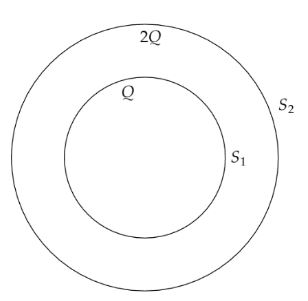Question
Question: The \({S_1}\) and \({S_2}\) are two hollow concentric sphere enclosing charges \(Q\) and \(2Q\), res...
The S1 and S2 are two hollow concentric sphere enclosing charges Q and 2Q, respectively, as shown in fig. What is the ratio of the electric flux leaving through the surface of S2 and S1?

Solution
Here, two hollow spherical shells are given in the figure. We have to find the total electric flux that is leaving through each shell. The smaller shell has a charge within it. While for the bigger shell it is the accumulation of both smaller and larger shells.
Formula used:
Electric flux has the formula of ϕ=ε0q
The variables are defined as, ϕ= electric flux and q= charge enclosed by the particle or body.
Complete step by step answer:
Electric flux is defined as the number of electric lines of force that passes through a given segment of area.Electric flux has the formula,
ϕ=ε0q
Now, the total charge enclosed by the hollow spherical shell S1 is Q.
The electric flux through that shell is,
ϕ1=ε0Q
The total charge enclosed by the hollow spherical shell S2 is (Q+2Q)=3Q
The electric flux through that shell is,
ϕ2=ε03Q
Therefore, the ratio of electric flux through the shell S2 to S1 is,
ϕ1ϕ2=ε0Qε03Q ∴ϕ1ϕ2=13
Therefore, the ratio of electric flux leaving through the surface S2:S1=3:1.
Note: It must be noted that electric field lines originate on positive electric charges and stop on negative charges. Field lines that are directed into a closed surface are considered to be negative while those which are directed out of a closed surface are considered as positive. If there is no net charge within a closed surface, every field line is directed into the surface, enters into the interior or is directed outward elsewhere on the surface. The mathematical relation between electric flux and enclosed charge is known as Gauss’s law for the electric field which is one of the fundamental laws of electromagnetism.
